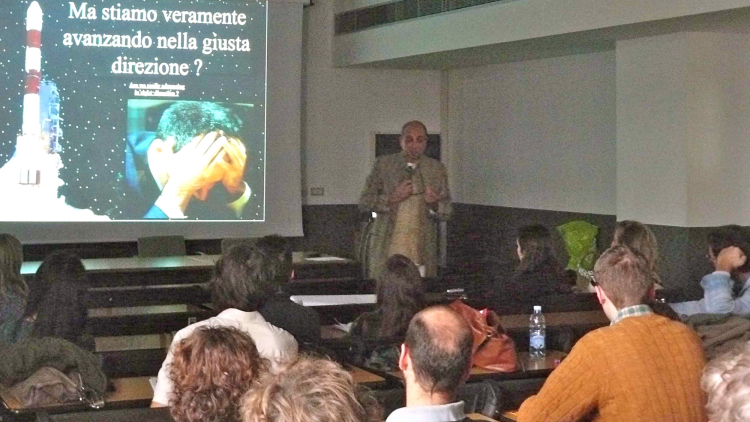ISKCON Italy Joins Official Government Interfaith Council in Florence
By Madhava Smullen | Авг 10, 2013

This January, ISKCON Italy was made a member of the Florence Council for Religious Dialogue, an official government entity.
This is a major development for ISKCON, which has been working with non-government interfaith groups such as Temple for Peace since 2005 and has held many interfaith conferences and events at the Villa Vrindavana community.
Most noteable is the fact that although only representatives of religions that are officially recognized in Italy are members of the Florence Council, ISKCON—although not an official religion—has been included.
“Because we are active in other interfaith groups, people from other traditions pushed the government, and finally they asked us to join the group and become an official member of the government’s interfaith dialogue,” says Villa Vrindavana temple president Parabhakti Das. “Normally they only allow people who are official ministers. But because they consider us an important part of society, and think we have something of value to share, they let us join.”
Also included in the council are representatives of Catholic, Protestant, Adventist, and Orthodox Christian traditions, as well as the Muslim, Jewish, B’ahai, and Buddhist faiths. Other faiths are also represented, bringing the total number of members to fifteen.
The council has official meetings four or five times a year at the city hall in Florence, along with further meetings online to share developments. Parabhakti will be attending all of these.
At the next scheduled meeting, in November, members will discuss how people of faith fare while in prison, and how different faiths help inmates. The director of the largest prison in the Tuscanny region will attend.
Although ISKCON Italy does not have any members in prison, ISKCON internationally has helped many inmates transform their lives with Krishna consciousness, and Parabhakti will be presenting this information to the council.
The council will also publish booklets on the topic of faith and prisons, which will be distributed and placed in public schools.
In a broad sense, the council’s meetings focus on how to improve the relationship between religions and society in general, and how religion can be useful for society.
“It’s important to remember that while the meetings are being held in Florence, they can also have an impact on a national level,” Parabhakti says.
Meanwhile being part of an official government council will also open a lot of doors for ISKCON.
For instance, Parabhakti expects that in two to three years, the movement will finally become recognized by the government as an official religion, a major step in Italy, where getting such recognition is far more difficult than in the US. This will also mean a lot of automatic benefits—for example, devotees will be accepted chaplains at hospitals, prisons, and other locations.
“The government will know that the Hare Krishnas are bonafide people, and will call on us at many different levels,” says Parabhakti.
Already, the members of the Florence Council for Religious Dialogue deeply appreciate ISKCON’s unique point of view, and its ability to give not just philosophy but practical advice that can help people in their day-to-day lives. Some have even become close friends with the devotees.
This, Parabhakti explains, is the result of devotees’ conscious efforts in recent years to eliminate any mood of fanaticism and “our philosophy is the best” syndrome, instead approaching other faiths with a humble, sharing attitude.
“One woman in the council from the B’ahai tradition said, ‘We cannot continue with the interfaith dialogue without the Hare Krishnas—they have very interesting things to say,’” Parabhakti recalls.
Meanwhile, as well as the Florence government, the Tuscanny government is also holding interfaith meetings and has invited Parabhakti to be involved.
“This interfaith dialogue is opening more and more doors, especially to the government level,” he says. “They see that the Hare Krishnas have something important to say, and they continue to invite us.”















